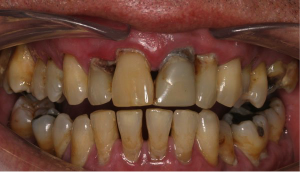Feb 27, 2016
 Gum Disease remains an epidemic health problem afflicting more than 67.4 million Americans, or more than half of adults 30 years or older, according to the American Academy of Periodontology. A plethora of research has linked gum disease to heart disease, diabetes, and stroke: three of the most costly chronic diseases in the U.S.. A new research study from the University of Louisville School of Dentistry, published this January, shows that Porphymonas gingervalis (P. gingervalis) bacteria from the mouth may also play a key role in the development and severity of Esophageal Squamous Cell Carcinoma (ESCC) Infectious Agents and Cancer. In an unhealthy oral microbiome, increased colonization by P. gingivalis promotes the conversion of a symbiotic to a dysbiotic of oral microbiota, or a “healthy” to “unhealthy” oral ecology. The spread of this oral pathogen is a process considered critical for the progression of periodontal (gum) disease. Similarly, an unhealthy microbiome, or dysbiotic microbiota, in the esophagus can potentially cause or exacerbate the severity of esophageal disorders.
Gum Disease remains an epidemic health problem afflicting more than 67.4 million Americans, or more than half of adults 30 years or older, according to the American Academy of Periodontology. A plethora of research has linked gum disease to heart disease, diabetes, and stroke: three of the most costly chronic diseases in the U.S.. A new research study from the University of Louisville School of Dentistry, published this January, shows that Porphymonas gingervalis (P. gingervalis) bacteria from the mouth may also play a key role in the development and severity of Esophageal Squamous Cell Carcinoma (ESCC) Infectious Agents and Cancer. In an unhealthy oral microbiome, increased colonization by P. gingivalis promotes the conversion of a symbiotic to a dysbiotic of oral microbiota, or a “healthy” to “unhealthy” oral ecology. The spread of this oral pathogen is a process considered critical for the progression of periodontal (gum) disease. Similarly, an unhealthy microbiome, or dysbiotic microbiota, in the esophagus can potentially cause or exacerbate the severity of esophageal disorders.
The study reveals that esophageal infection with P. gingivalis may lead to shifts in the microbiome involved in the development of esophageal cancer. For the first time, this research showed that P. gingivalis infects the epithelium of the esophagus of ESCC patients, establishing the association between the infection of P. gingivalis, an oral pathogen, and the progression of ESCC. It also suggests that the presence of P. gingivalis infection could be a biomarker for this terrible disease.
This research is among a number of major research studies published recently continuing to link an unhealthy mouth to deterioration in men’s health, women’s health, brain health and heart health. Gum disease continues to be one of the body’s largest sources of chronic low grade inflammation which can have ravaging effects on the entire body with links to a broad range of systemic diseases from Alzheimer’s Disease to Colorectal cancer. Gum disease has been shown to stem from a shift or imbalance in the oral microbiome, the natural ecology of the mouth. The causes of this shift have been shown to be multifactorial, but include the use of harmful oral care products contain detergents and chemotherapeutic agents (antimicrobials) in the mouth. With the belief that eradicating “bad bacteria” (often at the expense of “good bacteria” as well) would improve the health of the mouth, research has shown the opposite, primarily an exacerbation over time that can actually worsen the ability to restore microbial homeostasis or “rebalancing” of the oral microbiome.
A radical shift in our understanding in the management and maintenance of the oral microbiome is necessary. In the past 17 years, I have performed oral care product research that is an abrupt departure from the past “pesticide approach” to oral health with the use of detergents and antimicrobials. Even so-called natural oral care products continued to propagate an antibacterial approach with the use of natural detergents and potent herbal antimicrobial concoctions. Instead, we need to look at the mouth as the new frontier for “organic gardening.” As a result of this research which began years ago, I developed Revitin Oral Care products with a like-minded former dental school classmate, Dr. David Shuch. Containing a proprietary all-natural prebiotic formulation, known as NuPath Bioactives, Revitin toothpaste has been shown to restore and rebalance the oral environment in a safe and gentle manner, with an ingredient list that makes its even safe to eat, and could be considered a dietary supplement. It is rich in a patented formulation of Vitamin C and Coenzyme Q-10, along with Vitamin E, MSM, a blend of microminerals and flavored with organic stevia and natural essential oils. Revitin can be preordered now but will be available before April 30, 2016.